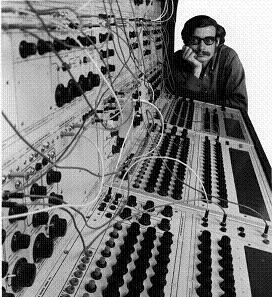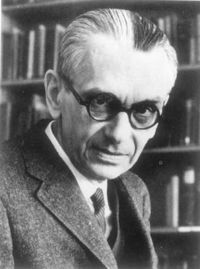A Sound Mind

The history of the word 'sane' is of no help to us. It derives from the Latin word for 'health', sanus. Mental health is too ellusive to derive from eating correctly, exercise, or getting enough sleep -the things we normally associate with health. The word 'sanity' has taken on a transfigured role in language to portray for us something for which we simply have no word. If we intend to understand sanity on the historical basis of its shaping through the years we shall fail.
And what of that German physicist who so generously left the high towers of science (and those who point at the height of those towers as a means of certainty and assurance) to offer us a definition of insanity? Should we say insanity is simply "Doing the same thing and expecting different results"?
Einstein, it will be remembered, was a genius in many affairs but he had his failures also. He failed to recognize the absurdity of quantum physics -what he called 'spooky action at a distance'. And, although the man seemed to be as sane as the next person (though who can say the next person is sane or even if sanity is common?), he failed to understand sanity in the same way.
If one is to know true human greatness -to not only recall it from stories of old but also to find it in one's own life alive and healthy- one must acknowledge the power of those who have failed, and failed, and failed still a hundred times more only to try once again and succeed.
The realm of science is a strapped-down world. We are told that if the conditions are in place and the controls are in order the same thing will always happen in the same way as a result of the same measures. The very thing science rules out as a complete and total rule is the Absurd.
Science can acknowledge that Joshua walked around the city of Jericho six times and nothing happened. It can acknowledge that the city stood or that it fell (for indeed it can be verified that cities have fallen and stood many times throughout history). What science cannot accept is that the seventh time the walls which had stood six times collapsed on the seventh.
And yet Einstein is remembered for his words about sanity. After all, there is something sound about them -something which even the most studied critic can accept about them. Einstein places the focus of his words on the expectation of those who act.
Now, it must be noted, that the common man has some notion of general relativity since people have become more educated (although perhaps they have also become more insane). The common man has also contended with his expectations and putting them into action -something simple and often overlooked by those who write in science journals.
There is something hard to bear about laboring to achieve something one never expects to have. The story of Pandora was told by the Greeks with dreadful tones -not in spite of the hope at the end, but because of it. The ancient Greeks, like Einstein, wanted nothing to do with a hope that outlasted tragedy and misfortune. They considered it more sound to strive thinking their efforts would come to nothing, and for this reason the Greeks loved their tragic heroes who worked hard, who perservered, who gambled their life in a few undertakings, and lost everything.
Perhaps the greatest hero in antiquity, Achilles, is best remembered for sulking among the ships of the Achaians after he gave his captured woman Brisies away to king Agammemnon. The Greeks listened to bards like Homer and thought, 'Yes, that's exactly how it should be! That's how life is!'
This is exactly the perverseness of the world we live in. When a child hopes to receive a bicycle for his birthday and instead receives a sweater he is not only sad but also ashamed for having hoped for the bicycle. We remember the stories of failed marriages because we wish to justify ourselves for not having believed in something as serious and wonderful as marriage. When we are punished for a wrong-doing we expect only hell for the disappointment of losing heaven.
If I could dare to offer a definition in words for the kind of sanity and sound mind which cannot be organized or formulated into words, I would venture to say it is having a clear picture of exactly the things or thing which one values most and believing that they can have it.
For reasons that hardly need to be said, this kind of sanity may be too daring. For every angel that whispers into a young man's ears: 'You can surely find an honest vocation and live an honest life' There is an unclean angel who whispers: 'Do you want to hope for the heights only to be sent to the depths? Take what you can get because only the cheaters and hopeless get anything in this life.'
Healthy thinking is a daunting path. It is far, far easier to believe that salvation is too inaccessible for us and so we must confine our expectations to half-salvations and hopelessness. In the end it has nothing to do with the intelligence of our minds which makes us sane, but our daring to believe and accept good things.
There is also a kind of half-sanity. A voice which says, 'I do not believe a good thing will happen to me, but if -in my doubting- something good does happen to me, it will be just as well as if I had expected it.' If a man listens to this voice too long, it will become his voice.
But however true the voice may sound it is wholly a lie.
This is a voice that points its bitter finger against God and accuses Him of injustice as a way of condescending God into handing something over. But God does not give into the demands of those who take hostages, even if such a man has taken his own mind hostage.
The child who clearly recognizes his dreams and secures a false contendedness -a contendedness which says he shall never meet his dream- is a child who carries with him a heavy burdern. This is why the wise Solomon warned that a hope deferred makes the heart sick.
In the same way a mind that no longer expects to find what it truly desires is an unhealthy mind, and when the health of such a mind becomes completely unhealthy it is insanus, or insane. With the death of the spirit, the mind is also dead even if it goes on thinking.
If a person is to accept this view of sanity, they must also accept that a healthy mind is not too far from them. The alternative is mentally unbearable.
So let us dare to believe that good will be extended to us and not evil. Let us dare to believe that what is ours may be healthy, and that what is sick may be healed. Let us expect to see good things in our own lives and in the lives of our neighbors. And let us rejoice in the good gifts we receive.
Labels: Angst, The System
Read More ...














